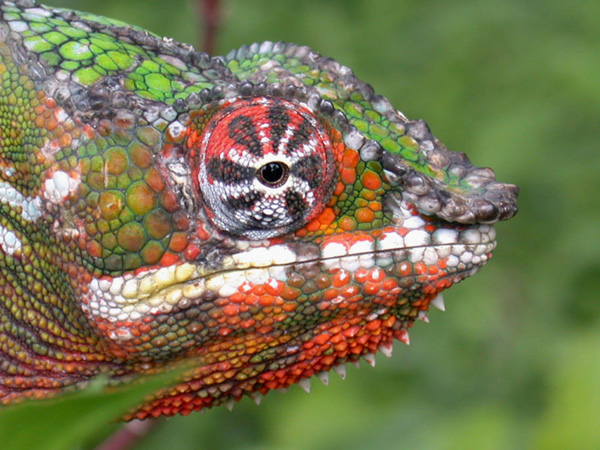Panther chameleons (Furcifer pardalis) carefully regulate exposure to sunlight in accordance with their Vitamin D3 levels, states an article published in the May/June issue of Physiological and Biochemical Zoology.
Nutrient Levels Affect Behavior
 Chameleons with high Vitamin D3 levels (achieved through a diet of vitamin-supplemented crickets) limited their exposure to the sun, while those maintained on a vitamin-poor diet maximized basking time. Further analysis showed that, as regarded individual Vitamin D3 levels, the lizards were “…as effective as mathematically possible” in achieving optimal sun exposure. Vitamin D3 receptors in the brain are believed responsible for accessing vitamin needs and controlling basking behavior.
Chameleons with high Vitamin D3 levels (achieved through a diet of vitamin-supplemented crickets) limited their exposure to the sun, while those maintained on a vitamin-poor diet maximized basking time. Further analysis showed that, as regarded individual Vitamin D3 levels, the lizards were “…as effective as mathematically possible” in achieving optimal sun exposure. Vitamin D3 receptors in the brain are believed responsible for accessing vitamin needs and controlling basking behavior.
Basking or Diet?
I was most interested in this article because, although this point was not specifically addressed, it established that panther chameleons can be provided with adequate Vitamin D3 (at least in the short term) through dietary means. I have long questioned my observations that certain reptiles, typically thought to be entirely dependent upon UVB radiation (basking) for Vitamin D synthesis, are none-the-less sometimes able to obtain sufficient Vitamin D3 from their diets (please see the article referenced below).
Some Cautions
Information of the type established by this research has a way of taking on a life of its own once spread via the internet, so a few words of caution are in order.
Please bear in mind that the Vitamin D and UVB needs of reptiles vary widely from species to species, and perhaps even within populations of the same species. This research applies to a single species housed outdoors with access to full sunlight, and should not be used as other than a baseline for further experiments as regards other animals.
For now, it remains important to provide the heliothermic (basking) reptiles that you keep with an appropriate UVB bulb (or natural sunlight) and to use vitamin/mineral supplements judiciously. This is a quite important topic, and one fraught with misinformation…please write with questions concerning individual reptiles.
Further Reading
For information on an outstanding UVB bulb and recent tests concerning its output, please see my article on Zoo Med UVB Lamps.
I have written about related experiences with day geckos and red-eared sliders… please see my article Has Anyone Observed This? for further details.
Image referenced from Wikipedia and originally posted by Tom Junek.
 That Reptile Blog – Reptile, Amphibian and Exotic Pet Care and Information
That Reptile Blog – Reptile, Amphibian and Exotic Pet Care and Information
